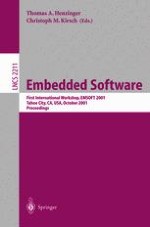2001 | OriginalPaper | Chapter
Compiler Optimizations for Adaptive EPIC Processors
Authors : Krishna V. Palem, Surendranath Talla, Weng-Fai Wong
Published in: Embedded Software
Publisher: Springer Berlin Heidelberg
Included in: Professional Book Archive
Activate our intelligent search to find suitable subject content or patents.
Select sections of text to find matching patents with Artificial Intelligence. powered by
Select sections of text to find additional relevant content using AI-assisted search. powered by
Advances in VLSI technology have lead to a tremendous increase in the density and number of devices that can be manufactured in a single microchip. One of the interesting ways in which this silicon may be used is to leave portions of it uncommitted and re-programmable depending on an applications needs. In an earlier paper, we proposed a machine architecture for achieving this reconfigurability and compilation issues that such an architecture will face. In this paper, we will elaborate on the compiler optimization issues involved. In particular, we will outline a framework for code partitioning, instruction synthesis, configuration selection, resource allocation, and instruction scheduling. Partitioning is the problem of identifying code sections that may benefit by mapping them on to the programmable logic resources. The instruction synthesis phase generates suitable implementations for the candidates partitions and updates the machine description database with the new instructions. Configuration selection is the problem of narrowing down the choices of which synthesized instruction (from the set generated by the instruction synthesis phase) to use for each of the code regions that will be mapped to programmable logic. Unlike traditional optimizing compilers, the adaptive EPIC compiler must deal with the existence of synthesized instructions. Compilation techniques addressing each of these problems will be presented.
